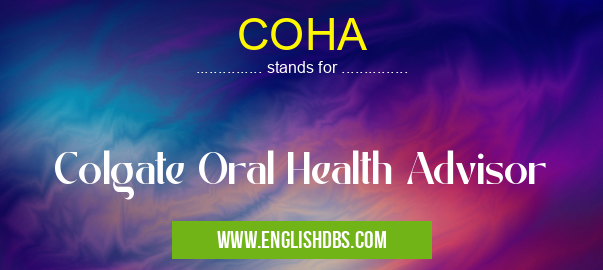What does COHA mean in HEALTHCARE
The Colgate Oral Health Advisor (COHA) is an innovative initiative launched by Colgate to help people get the best possible care for their oral health. It has been designed to provide individuals and families with tailored advice on brushing and caring for their teeth, as well as general tips on how to avoid common issues like cavities and plaque buildup. The COHA program is unique in that it is tailored specifically to each person's individual needs.

COHA meaning in Healthcare in Medical
COHA mostly used in an acronym Healthcare in Category Medical that means Colgate Oral Health Advisor
Shorthand: COHA,
Full Form: Colgate Oral Health Advisor
For more information of "Colgate Oral Health Advisor", see the section below.
» Medical » Healthcare
Benefits of COHA
Using the COHA platform has a number of benefits for users. First, it allows them to make more informed decisions about their oral hygiene because it provides advice specific to their personal situation. This reduces the risk of choosing an incorrect product or technique which could end up causing more damage than good. Additionally, because all of the information is provided online, it's convenient for users who don't have time to visit a dentist regularly. Finally, since it's free, there are no additional costs associated with using COHA other than those associated with purchasing any recommended products or treatments.
Essential Questions and Answers on Colgate Oral Health Advisor in "MEDICAL»HEALTHCARE"
What is the best way to brush my teeth?
Brushing your teeth should take two minutes, twice a day! Start by angling your toothbrush away from your gums at 45 degrees and use short, gentle strokes, making sure to reach all surfaces of all teeth. Using toothpaste that contains fluoride, brush for two minutes in a circular motion and finish by brushing your tongue for fresh breath.
How often should I floss?
The American Dental Association recommends flossing daily for optimal oral hygiene. Flossing once per day helps remove plaque and food particles that are not reached by brushing. Take 18-20 inches of dental floss and gently slide it between each tooth and curved around the sides of the teeth. Remember to use clean sections of the floss as you go!
What is plaque?
Plaque is a thin film of bacteria that forms on teeth when sugar reacts with bacteria found naturally in saliva in your mouth. If left untreated, plaque can cause cavities, gum disease, and eventually tooth loss. Brush twice a day and floss regularly to help reduce plaque buildup.
Can I replace regular brushing with mouthwash?
No! Mouthwash can help freshen breath and kill certain germs between brushings, but it cannot replace regular brushing with toothpaste which is necessary for removing plaque buildup. Use mouthwash after brushing as an additional step for optimal oral hygiene.
Is it okay to drink coffee or tea?
Absolutely! Enjoying one or two cups of coffee or tea during the day is perfectly fine — just remember to rinse with water afterward to help balance the pH level in your mouth and reduce risks associated with staining on the surface of your teeth.
What is the best type of toothbrush?
Look for soft-bristled brushes that fit comfortably into your hand; this will help ensure proper technique while brushing. For more effective cleaning results choose brushes with round ends rather than flat ends so as not to irritate sensitive gum tissue while brushing.
How do I know if I need a new toothbrush?
Toothbrushes should be replaced every 3-4 months or sooner if bristles appear worn or frayed; an old toothbrush will not be able to effectively clean surfaces of the teeth properly leading to more build up of plaque over time.
Is it necessary to rinse after brushing my teeth?
While rinsing isn't mandatory after every time you brush; rinsing with water after every meal can be beneficial since it helps clean any leftover particles from between your teeth left from eating.
How often should I visit my dentist for checkups?
Visit your dentist twice a year (or once every 6 months) for professional dental cleanings; this visits allows dentists to catch any underlying issues before they become serious problems - regular visits also aid in maintaining healthy gums free from periodontal diseases.
Is tartar harmful?
Yes - tartar build up can be very harmful if left untreated over time as it creates a hard layer on top of existing plaque making it harder to remove causing irritation that leads to inflammation, receding gums and eventually gum disease without proper care.
Final Words:
The Colgate Oral Health Advisor (COHA) is an innovative platform that provides users with tailored advice and materials related to oral hygiene so they can make informed decisions about their dental care based on their unique situation. With its personalized approach and convenient format, utilizing this program can be beneficial for anyone looking to maintain healthy teeth and gums without having to break the bank!
